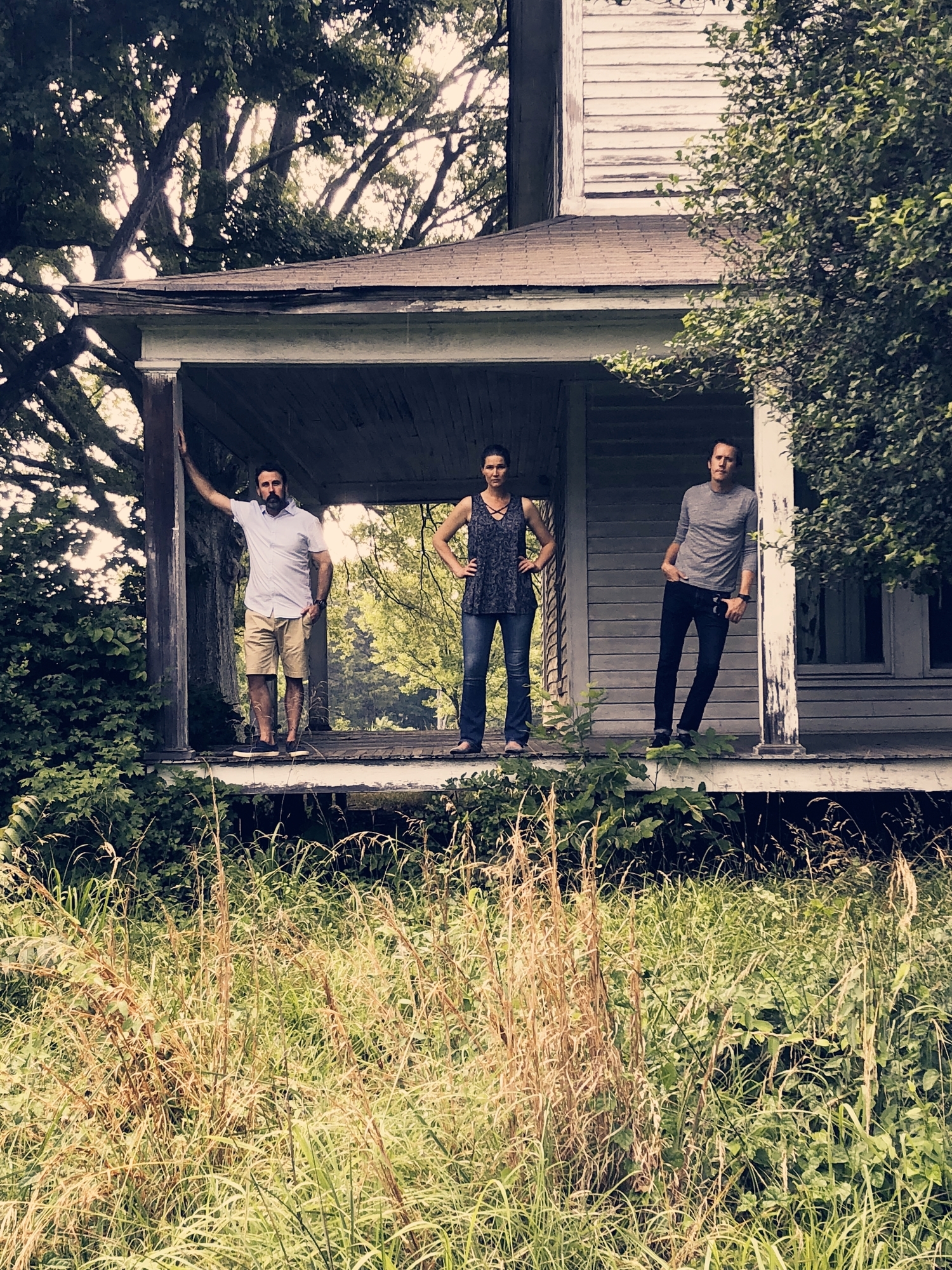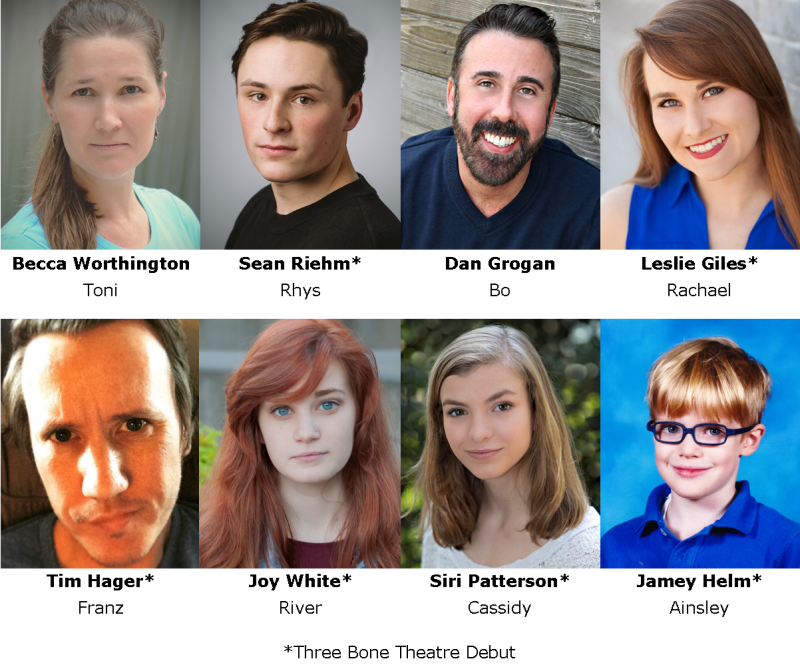Review: APPROPRIATE Sports Multiple Meanings and Graveyards

Two graveyards flank the Lafayette home in southeast Arkansas, dating back to its antebellum plantation days. One of these cemeteries preserves the remains of the former owners' family and the other, receiving less upkeep perhaps, the bones of their slaves. Yet it seems, as we become more and more familiar with the Lafayette siblings in Branden Jacob-Jenkins' APPROPRIATE, that there are also - figuratively, anyway - at least two more graveyards inside the home. And a malevolent ghost.
As the sibs gather at the old homestead, poring over their dad's possessions a few months after the funeral, prepping the place for a scheduled auction and liquidation, it's obvious that the home is a graveyard for blurred childhood memories that don't align with each other. Old grudges and animosities rise freshly out of their tombs. Just as dramatically, there are damning objects buried among Dad's salable possessions.
He could have been a virulent segregationist, a KKK member, or even part of organized lynch mobs. Or he could have merely been a collector of such grisly artifacts. Or they may have simply come down unnoticed from the original plantation owners.
Ambiguities abound, and in the Three Bone Theatre production now at Spirit Square, they aren't shying away from the confusion. If anything, these tantalizing uncertainties are sharpened by director Sarah Provencal and her cast. On the title page of the playbill, definitions for "ap·pro·pri·ate" are offered for both the adjective and the verb, inviting us to be unsure about even how to pronounce the name of what we're watching.
Thanks largely to Rachael, "Bo" Lafayette's annoying and judgmental Yankee wife, and Franz his black sheep younger brother, we're scrutinizing the inheriting generation as much as the deceased. Is the elder sister, Toni, showing her racist colors when she denies knowing of any evidence of Daddy's bigotry? Or how about when she presumes that River, Franz's fiancée, is Native American on the basis of her braided hair? Does it count as denial that Bo has been oblivious to the second cemetery outside?
Thanks again to Rachael's stridency, we also occasionally wonder, as we sit watching this venal spectacle, whether we ourselves are too quick to judge, victims of our own prejudices. Certainly that is a strong component of Jacob-Jenkins' intent. After we reach preliminary conclusions, we may have to recalibrate when we discover that more than a couple of these people are capable of keen reflection and insight.
What fascinated me even more was what none of the lively folks onstage perceived, for amid the squabbles, the stressing, the venting, the scheming, and the violence, Jacob-Jenkins is exploring what makes families tick or malfunction. The easiest part of all this to convey is the diverging narratives we build from different perspectives - as basic as I-was-there-and-you-weren't in some cases - and from simple misperceptions, sometimes as simple as taking our eyes off the ball. Or a photo album.
These differences can explode. But more subtly, we can fail to communicate - or screw up when we try.

That's why it's tough for me to choose among the three most stellar - and introspective - performances currently on view at Duke Energy Playhouse. For sheer octane and horsepower, nobody surpasses Becca Worthington as Toni for keeping hostilities blazing hot. Toni hates everybody for leaving all the caretaking and dirty work to her (a staple gripe in family sagas like these), but despite all the venom she spews at everyone in sight, she'd like somebody to love her. Quite funny if you think about it, because Toni doesn't come off as anybody's doormat.
On the other hand, Leslie Giles actually seems to believe she's in a comedy as Rachael, jarringly shrill in her perpetual alarm, taking offense so readily that she eventually earns it, and parenting as if every moment were a dire emergency . Things don't go well between the chronically caustic Toni and the high-strung Rachael. You'll strain to determine who's more in the wrong - or more sincere in her self-loathing.
Of the two brothers, I find Franz far more significant, textured, and engaging than Bo. Yet you'll see that Dan Grogan has plenty to chew on as Bo, trying to fix his siblings' messes and get the maximum return on the family estate while maintaining peace with his virago wife. He treads fine lines with his steamrolling missus, who feels she has been targeted for anti-Semitic bias by Toni's precious dad. Bo strives to prevent the inevitable explosions when Rachael pushes her sister-in-law's limited patience too far. We probably dislike Grogan most for seeming so pragmatic, grounded, and occasionally spineless.
Home after many years of being on the road and out of touch, showing up months after Dad's funeral just in time for the auction - with a youthful New Age fiancée on his arm who adores him - Franz is the object of suspicion, resentment, and envy. So why did I find myself liking him in spite of his past as a sexual predator? I guess I was as captivated as River was by his mellow, slightly dopey earnestness.
What drills down to the essence of Jacob-Jenkins' dissection of family life are Franz's repeated efforts at meaningful communication. Ignoring his sibs' suspicions, Franz tells the family that he has come home to apologize to them, not completely sure he believes it himself. But he makes a big deal out it, clumsily reading a handwritten apology that is more than a cursory couple of sentences. Tim Hager gets the awkwardness of this man down to the bone, trying to believe he has finally turned the corner to personal redemption. Even more pathetic are Franz's incoherent efforts to mentor his nephew Rhys - at a vulnerable moment when it might be more prudent to just leave the embarrassed teen alone.
Maybe well-meaning inarticulateness is Franz's true inheritance from his father and the true reason why his life has so frequently jumped the rails. Very American, this Franz. We've had a couple of inarticulate presidents during this blundering century, one of them fairly likable. Hasn't worked out so well.
The younger APPROPRIATE generation does seem to include River, and all four of them seem to offer us rays of hope. Despite her hippy-dippy spiritualism, Joy White doesn't gloss over River's inclination to look after Franz's financial interests, becoming a rounder, savvier adventuress than we first surmise. There's a modicum of chemistry between Sean Riehm as Rhys and Siri Patterson as his cousin Cassie, Rachael's daughter. Clearly, the teens' parents worry about them more than is necessary. Jamey Helm completes the cast as Cassie's younger brother, not so much bratty as speedy. His darting sprints from one end of the stage to the other heighten the overall sense of turmoil, clutter, and chaos.
You may be troubled by this Three Bone production, but you won't be bored. Special perk: Jacob-Jenkins devises a stunning way to end a family brawl.
Photos by Phylisha Mace
Add Your Comment
Videos
